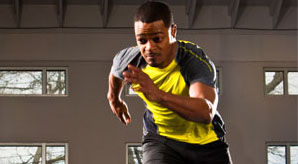
If you’re looking to train athletes, be prepared to answer some questions about your own training first.
Athletes always look for a competitive edge and have concrete goals. They are demanding of themselves and, whether they actually say it or not, they will demand a lot from you. They’ll be looking for a trainer with the right education and skills to help them maximize their potential, gain a competitive edge and reach their goals. Besides having a good understanding of the sport, you need to gain the trust of your athlete clients—they want to win, and want the confidence that they are aligned with the best.
Athletes will rely on your expertise to provide sport-specific drills and exercises to improve their technique. You need to be able to design sport-specific, goal-oriented programs and identify movement patterns that impede athletic performance or could lead to season- or career-ending injuries.
There are many benefits to working with athletes:
- Athletes are intrinsically motivated—you just need to give them an extra push.
- Their success is your reward (i.e., client retention and referrals, higher reputation among other athletes).
- Their desire to win will inspire you to become a better trainer.
Job Outlook Strong for Fitness Professionals
According to the Bureau of Labor Statistics “Occupational Outlook Handbook, 2010-2011 Edition,” fitness worker jobs will grow 29 percent by 2018. That alone is good news for trainers looking for new career opportunities or wanting to enter into this rewarding career track.
The higher demand for trainers is partly driven by baby boomers looking to stay active and fit well into their retirement years. Among this population, you’ll also find many hard-core athletes.
An article that appeared in AARP magazine, which promotes active aging, confirmed that the notion that people can’t be serious athletes past age 30 is long gone. A study of master athletes at the Ironman World Championship in Kona (a triathlon race comprised of a 2.4-mile swim, 112-mile bike ride and 26.4-mile run) showed that the top male finishers ages 60 to 64 were only a few minutes slower compared to the top 30- to 34-year-old athletes.
Given the normal age-related decline in lean muscle mass, these athletes rely on personal trainers to help them build the muscle strength they need to excel in their sport.
ACE’s new Sports Conditioning Workshop will give you an all-around education for helping athletes maximize their potential. A systemic approach to sports training, this workshop teaches you about proper progressions in intensity, complexity and movement that are suitable for every athlete’s skill and conditioning level, and more.
Register Today